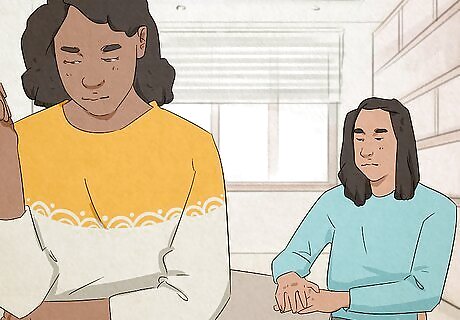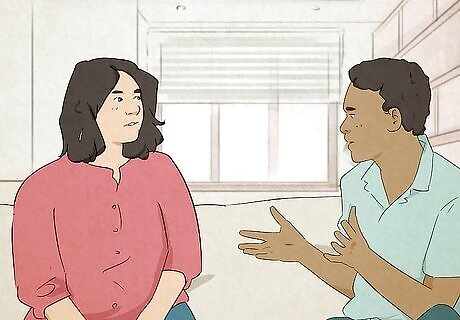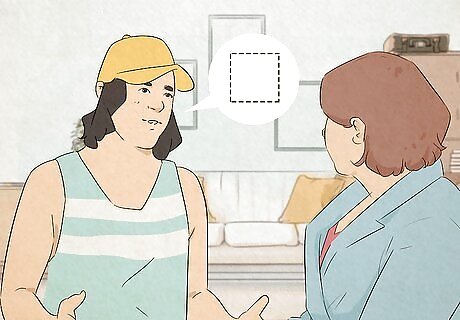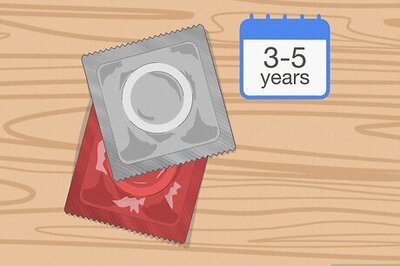
views
Take the relationship slowly and watch for red flags.

Avoid making a big commitment until you're sure it's a healthy dynamic. In the first year or so of a relationship, you're really just getting to know your partner. This is the time when you should really be evaluating whether or not you're a good fit for each other. Give yourself time to really get to know this person before you fully commit to them, like moving in together or agreeing to marry them. During that time, pay close attention to the following red flags: Disrespectful behavior or speech Angry flare-ups Dishonesty Moving too fast Breaking up and getting back together frequently Threats of violence or self-harm if the relationship ends Pressuring or forcing you to do sexual things you're not comfortable with Physical violence (make this an immediate dealbreaker)
Talk openly with your partner about red flags.

Addressing them early on will let you know if things can be fixed. If you notice something in your relationship that seems troubling, open up and talk to your partner about it. It can be hard to bring up unpleasant subjects, but in the long run, talking about your concerns can help you create healthier boundaries in your relationship. Try to share your thoughts in a kind and loving way, and be patient and actively listen when your partner talks. In a healthy relationship, you should be able to resolve conflicts calmly. It's a big red flag if you feel like you can't talk to your partner about any of your concerns. If they regularly shut you down when you try to talk about problems, it's probably a sign the relationship isn't healthy and you should leave.
Use "I" statements when you share your feelings.

Speaking from your own perspective can make your partner feel less defensive. If something is bothering you, it doesn't help much to point the finger at your partner. They're more likely to shut down, and nothing will get resolved. Instead, share your feelings with "I" statements to give your partner insight into why it's important for you. For instance, instead of saying, "You never help me with the dishes!" you might say, "I sometimes feel frustrated when I have to do all the dishes myself. I was wondering if we could find a compromise that works for both of us."
Set boundaries and stick to them.

Make it clear early on what is and isn't okay. While all relationships take some compromising, there are some things that should be non-negotiable for you. These might be things like not being lied to, the other person following through when you make plans together, being exclusive with each other, not being yelled at, and so on. Communicate these clearly to your partner. If they make a habit of disrespecting those boundaries, that's a huge red flag and you should leave the relationship. For instance, you might say, "It's really important to me to spend time with my sister. It's embarrassing and upsetting for you to call me over and over while I'm there, and I'm not okay with that. If it keeps happening, I can't be with you." If someone acts in a way that's abusive, communicating your boundaries may not be enough. It's best to leave these situations as early as possible so things don't escalate.
Stay true to yourself, even if they ask you to change.

It's not a good sign if your partner asks you to be someone else. Maybe they want you to dress differently around their friends, laugh a little less loudly at your favorite comic, or change your job. These are huge red flags! Your partner should love you for exactly who you are, and if they don't, it's probably time to leave the relationship. Also be wary if your partner asks you to quit hobbies or activities that you enjoy. It's fine if your partner asks you to compromise on little things, like not clipping your toenails over the carpet or not leaving dirty dishes in the sink. However, they should never ask you to change the core of who you are.
Make it clear that you won't tolerate dishonesty.

Calmly explain that you know they lied and you won't accept it. If you catch your partner lying, it can be really upsetting, but it doesn't help to blow up. Instead, have a calm discussion where you let them know you're aware that they were dishonest, and talk about how that makes you feel. While one instance of lying might not be enough to end the relationship, it is a big red flag. If it turns into a pattern, you should leave. For instance, you might say, "One of my friends texted me a picture of you at a party Saturday night when you said you were at home studying. I'm really hurt that you felt like you had to lie to me about that. We can't have a healthy relationship if you lie."
Stand up for yourself against controlling behavior.

It's unhealthy for your partner to make all the decisions. They shouldn't try to tell you who you can spend time with, what you should wear, or how you should act. If you notice behaviors like this, speak up and let your partner know that you expect an equal role in the relationship. If you confront it early on and stand your ground, you may be able to curb controlling behavior. However, some people have a tendency to control their partners, so you may need to end a relationship where this happens. This dynamic can quickly become toxic. If it doesn't change after one or two instances, it's best to get out before the problem becomes worse.
Don't let your partner cut you off from family and friends.

An abusive partner may try to stop you from seeing them. They might try to make you feel like you're "choosing" your loved ones over them if you try to see them. This is a really unhealthy dynamic that's only likely to get worse over time. If you notice this, firmly make it clear that spending time with the people you love is important to you, then make and keep dates with them as regularly as possible. If this turns into an ongoing issue with your partner, it's probably best to end the relationship. Keep in mind that if your partner only has concerns about your relationship with one person, it's not necessarily a red flag. Still, they should never tell you who you can or can't see.
Give your partner positive feedback if they're trying.

It can help to acknowledge when they're making an effort. They might not get it right on the first try. However, if you can tell that they're trying to change, it may be worth being patient through the process. Let them know you appreciate the effort that they're making, even if it's not exactly what you're looking for. That will help encourage them to keep trying, and things should get easier over time. For instance, if your partner normally shuts down instead of communicating, tell them how much you appreciate their effort if they share something that's bothering them, even if they said it in an abrupt way. If your partner has been reluctant to commit, let them know it means a lot to you when they introduce you to a close friend—even if they're not ready for you to meet their parents yet.
Talk to a counselor if you need additional help.

A third party can give you both perspective on the problem. It can be hard to overcome relationship red flags on your own. If you're arguing a lot or you're having trouble trusting each other, it can help to talk to a trained relationship counselor. They'll help mediate your conversations so you can really understand where the other person is coming from.
End the relationship if the problem doesn't get better.

If nothing changes after you talk about it, move on. It's fine to try setting boundaries and talking about your feelings, and these can have positive outcomes in a lot of cases. But they shouldn't necessarily be long-term, ongoing conversations. If you've raised your concerns and they don't seem interested in making a change, or if they get defensive whenever you bring up their red flags, it's a toxic situation and you should leave. For instance, if they refuse to compromise or you catch them being dishonest, it's a good idea to consider leaving. You should also leave if the relationship feels constantly negative or draining. A healthy relationship has more good than bad! If your partner is making an effort, it's okay if things don't turn around right away. If they stop trying, though, you may be better off on your own.
Leave as soon as it's safe if they're abusive.

This includes verbal, emotional, and physical abuse. There are a lot of red flags you can try to work through, but abuse isn't one of them. If your partner is calling you names, putting you down, pushing or hitting you, or showing any other signs of abusive behavior, leave the relationship as soon as you feel safe doing so. If you need to, ask your family and friends for help, or contact law enforcement and let them know you need someone to be present while you gather your things to leave. You can also contact a hotline for resources and advice. For instance, in the US, call National Domestic Violence Hotline at 1-800-799-SAFE (7233) or text START to 88788.




















Comments
0 comment